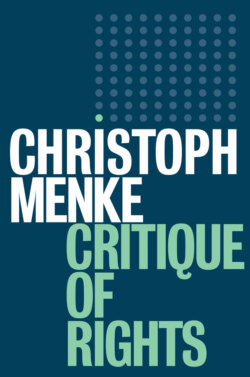Читать книгу Critique of Rights - Christoph Menke - Страница 15
From Share to Power 1 Athens
ОглавлениеGreek legal theory grasps the concept of a right – as Aristotle puts it in the fifth book of the Nicomachean Ethics – in its definition of “corrective” justice, “corresponding to the two classes of private transactions, those which are voluntary and those which are involuntary.”1 It is essential that transactions regulated by corrective justice involve a relationship between equals. Such justice does not involve the relationship to an “officer.”2 Corrective justice constitutes the field of private law and applies to both voluntary and involuntary transactions. In other words, it applies to “the interchange of services … in the form of Reciprocity,” in which the parties concerned exchange goods with one another. And it also applies to transactions in which one party has injured another, and where the resulting damage must now be corrected.
What justice means here is revealed in this second case, in the rectification of damage or loss: establishing or securing a state of equality, a “mean by way of arithmetical proportion between the greater and the less.” “And thus … Justice in Rectification will be the mean between loss and gain.”3 This rectification of equality can also be described as a way for each to receive his share – or, to put it simply, his right [Tr. – sein Recht]:
Thus the just is a sort of mean, inasmuch as the judge is a medium between the litigants. Now the judge restores equality: if we represent the matter by a line divided into two unequal parts, he takes away from the greater segment that portion by which it exceeds one-half of the whole line, and adds to it the lesser segment. When the whole has been divided into two halves, people then say that each “has their share,” having got what is equal.4
Aristotle’s conception of one person’s right vis-à-vis another is that a person has the right to his own. In the case of loss, a judge corrects this right by awarding restitution to the aggrieved party, so that the latter thereby recoups his just or equal share:
to have more than one’s own is called gaining, and to have less than one had at the outset is called losing, as for instance in buying and selling, and all other transactions sanctioned by law; while if the result of the transaction is neither an increase nor a decrease, but exactly what the parties had of themselves, they say they “have their own” and have neither lost nor gained. Hence Justice in involuntary transactions is a mean between gain and loss in a sense: it is to have after the transaction an amount equal to the amount one had before it.5
The right that one party has is his own as equal share. The individual’s claim is the just share, which is due him according to the rules of equal distribution.
This is just as applicable to the voluntary transaction between persons in exchange, in which justice does not exclusively require providing restitution for a loss, but can also be satisfied by simply engaging in a quid pro quo with the other party. To be sure, equality cannot be understood here in arithmetical terms (as is the case in restitution, where the loss suffered is rectified: “For it makes no difference whether a good man has defrauded a bad man or a bad man a good one”).6 Proportional justice, however, which determines the exchange of different goods, has precisely the same meaning: it produces a state of equality – a state in which it can be said that, with his just share, each has received his own.
There will therefore be reciprocal proportion [C.M. – in exchange] when the products have been equated, so that as farmer is to shoemaker, so may the shoemaker’s product be to the farmer’s product. And when they exchange their products they must reduce them to the form of a proportion, otherwise one of the two extremes will have both of the excesses; whereas when they have their own, they then are equal, and can form an association together, because equality in this sense can be established in their case.7
The demands that individuals make on each other are legal claims, which they are entitled to make against one another, if the goal is for each to “have their own.” Similarly, in contract and indemnity law, both exchange and restitution require a state of equality that defines individuals’ respective entitlements. “Thus attention to the equality of gain and loss in corrective justice [C.M. – likewise with the equality of rendering a service and receiving the same in return in contract law] presupposes the notional equality of initial holdings,”8 which is either compensated for in restitution or realized in exchange. Equitable distribution determines what this equality of shares or “initial holdings” (as Weinrib puts it) consists in, however, and thereby determines each person’s own: right as one’s own is what is commensurate or corresponds to each person as he is. Just as the arithmetical equality of rectification presupposes that distribution disrupted by loss was rectified,9 so the proportional equality of exchange consists in the realization of goods and rendering of services according to their relative significance in the life of the community – in the satisfaction of needs whose regulation is the state’s political responsibility. The fair share is the basis for corrective equality and for the equality of exchange. Right [Recht] as an individual’s claim is based on law [Recht] as just order. The proper ordering of persons and objects whose regulation, production, and safeguarding is a political matter, and forms the basis for any private claim that one individual is entitled to make vis-à-vis another.
